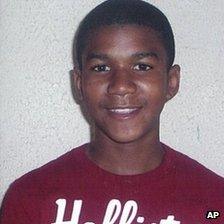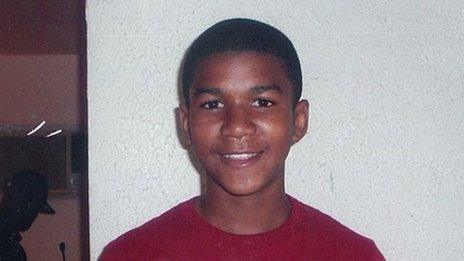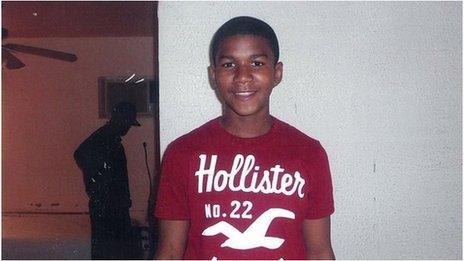Public fury over 'racist' Trayvon Martin killing
- Published
- comments

Trayvon Martin was carrying only sweets when he was killed
There's mounting outrage at the shooting dead of an unarmed black teenager in Florida - it is online , externaland it is on the streets. , external
The reason for the fury is the belief that 17-year-old Trayvon Martin was a victim of racism. Not what is now called a "hate crime" - not that he was targeted for random violence because of his colour. Not that sort of racism, but the racism of assumption: that a black teenager in a hoodie in smart neighbourhood must be up to no good.
It is the assumption by police that the man who shot him was telling the truth, that it was self defence, even though Trayvon was near his own home, armed only with a bag of sweets and a soft drink.
The anger is all the stronger because a series of emergency calls to the police, external are very revealing and disturbingly graphic.
In the first, the neighbourhood watch captain, George Zimmerman, shows his suspicion of the teenager: his anger that could be summed up as "they" keep getting away with "it" and his refusal to listen to police advice to not go after Trayvon Martin.
There are disturbing 911 calls from neighbours where you can hear prolonged screaming in the back ground. And then a single shot.
Then there is the testimony of a friend, external who Trayvon called moments before his death, when he asks why he is being followed. Then there are sounds of a struggle.
The police did not arrest the man who shot the teenager, even though he, unlike Trayvon Martin, had been arrested in the past., external
Florida, though, has a law - often known as the "stand your ground" that makes it far from certain that those defending themselves can be arrested for a crime.
A very few see the outrage as orchestrated by a liberal media. There has been a bit of an odd argument that Mr Zimmerman was not white but Hispanic.
But it is pretty obvious a lot of black people think it self-evident that this is about race.
Chauncy De Vega has some profound reflections on this which are well worth reading., external
It is only 72 years since Congress would not pass a law making lynching illegal.
The US has travelled a long way since then, but it is not surprising that cases like this stir up fears that some lessons have not been learnt well enough.
- Published20 March 2012

- Published20 March 2012
